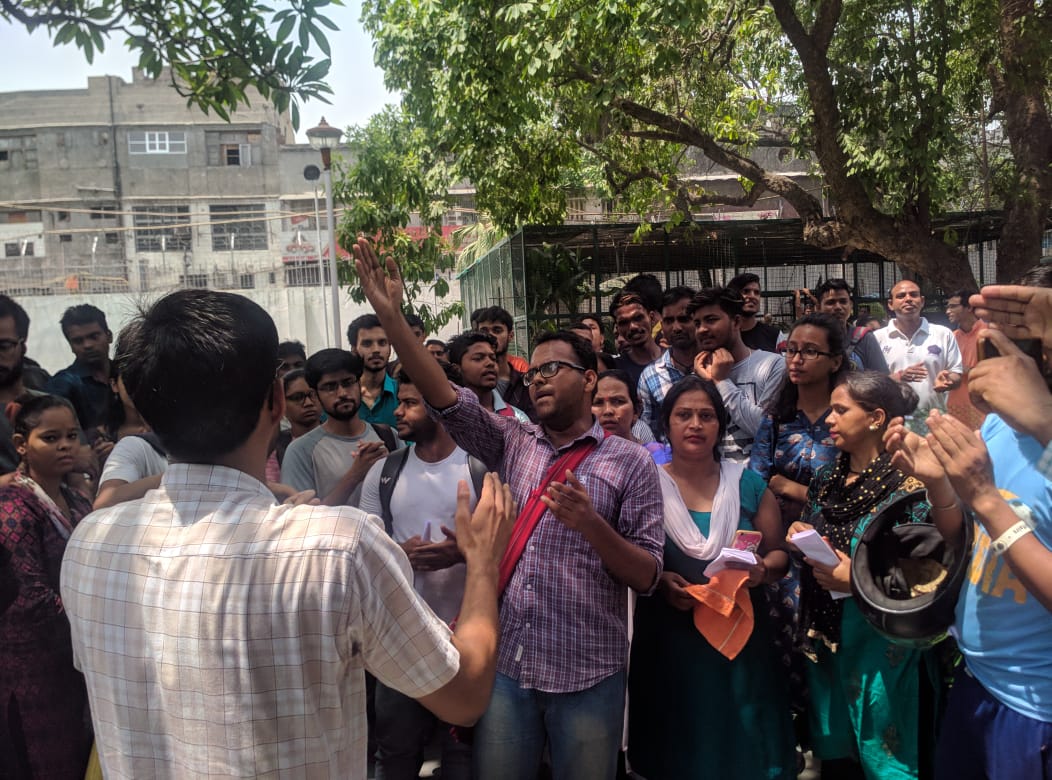“If you continue to accept your lowly status ungrudgingly, continue to remain dirty, filthy, backward, ignorant, poor and disunited, they will allow you to live” – Dr. B R Ambedkar
On June 3rd, hundreds of Ambedkar University students stood in solidarity at Kashmere Gate with the campus safai karamchands after they were unfairly dismissed for protesting against manual scavenging, which has been criminalized under the Prohibition of Employment as Manual Scavengers and Rehabilitation Act, 2013.

This Act dictates the eradication of manual scavenging and mandates the rehabilitation of families dependent on this profession. It is a non-bailable offence with imprisonment of up to 5-years, and yet, the conviction rate for these crimes is negligible.
52 workers were fired and asked to leave campus immediately. Some of these workers have been with Ambedkar university for over 5 years and had relocated their premises to be closer to the place of work.
Despite the existence of laws that protect the dignity of labour, there are approximately 700,000 sanitation workers in India who continue to work as manual scavengers. The governments of different states underrepresent this number and refuse to acknowledge their continued existence. Safai Karamchands in India are exploited with low, below the wage pay and no safety measures to deal with the sewage such as gloves, gas masks, and other protective gear. Contractors refuse to give the workers’ their constitutional right to dignity of labor, knowing fully well that these workers belong to marginalized communities and lack the resources and representation to voice their issues.
The Safai Karamchari Andolan that works for the safety of sanitation workers estimates the death of 1,850 people in the last decade. They estimate the death of one sanitation worker every five days. Even these figures seem under-represented because there are 2.6 million dry latrines in the country that are cleaned by manual scavengers.
Also read: #StopKillingUs: India Rises Against Manual Scavenging
Prime Minister Narendra Modi has promised the eradication of manual scavenging by 2019, but India’s ground reality remains too grim for this promise to be fulfilled. Manual scavenging has been a blot over the so-called modern society in India since decades now. A practice that was institutionalized in the medieval ages has lingered on for centuries and is still the backbone of most of the sanitation works in major cities across India. But more than the work itself, the concern are the workers. Called by a number of racial slurs, it has always been the Dalits that have been either forced directly or indirectly to dirty their hands, cleaning the filth of other people. But unfortunately, for millions of Dalit people across the nation, this is the only means of livelihood, the casteist society and structure offers them.

A huge metropolitan like New Delhi is still plagued by manual scavenging. And this case comes right from the womb of Ambedkar University that was structured around the egalitarian framework.
An internal student email was sent across with the quote by Ambedkar (find above), urging students to protest against a casteist, Savarna administration that exploits these Class IV workers.
The Safai Karamchari Andolan that works for the safety of sanitation workers estimates the death of 1,850 people in the last decade.
The first insight into the case comes from students of the Dalit Bahujan Adivasi Collective, a student body working for the rights of the marginalized communities in the society. The DBAC submitted a written complaint to the VC and the Registrar about the open sewers in the Kashmere Gate campus of AU. The findings of which were not shared with the student body and were actually kept under the wraps. The students who were part of the protest believed that the committee findings should be transparent and made publically available.

This is not the first act of discrimination against the safai karamchands on Ambedkar University campus. An institution built on the very foundation of equality was marred by an act of gross discrimination. A startling fact that came into the picture was when Prof. Bidhan Das, an investigating professor on the case had been severely discriminating against the Sulabh workers that worked for Ambedkar University, who were demanding their constitutional rights. The Sulabh workers were also barred from distributing sweets on the 15th of August last year, which they had been doing for half a decade now. If this wasn’t all, the Joining DR Estate Division, Mr. Lokesh Gard was recorded spurting racial slurs (“I don’t even like to talk to people like you”) towards the workers. He was made to apologize for these comments on a later date.
Mid 2018, students first noticed that the workers were made to open sewers and began protesting. However, because the workers didn’t know their rights, they didn’t join along. However, by September 2018, they were made aware and they decided to be part of the agitation against the administration. The workers though were afraid of losing their jobs and this recent incident at Ambedkar University made their worst fears come true. For the past 6 months, the workers’ contracts were changed to one month tenors till the university could find an alternate vendor.

On May 31st, 52 workers were fired and asked to leave campus in 15 minutes which sent waves of shock through the students and worker community. Some of these workers have been with Ambedkar University for over 5 years and had relocated their premises to be closer to the place of work. Students alleged that the administration strategically timed the protest during summer vacations to minimize student resistance and intervention. The workers were initially contracted with Sulabh International, an NGO that failed to provide them with Employees State Insurance or Provident Funds benefits.
According to a student representative of the DBA, on June 4th, the university called the workers for a meeting and decided to re-instate 33 of the workers (including the 10 women workers who would remain at the Kashmere Gate campus) and relocate the rest of the workers to other educational campuses. According to Akunth, who is a member of Dalit Bahujan Adivasi collective, “Workers wanted to retain their employment in a dignified manner, one of their superiors who behaved with them in casteist manners also issued a written apology.” Ambedkar University also sent over a letter to the new vendor, Bhagwati Enterprises, who have agreed to provide the workers with ESI and PF benefits. However, they will only do this on the condition of recruiting their own labourers.
Also read: Divya Bharathi’s ‘Kakkoos’ And The Casteist Reality Of Manual Scavenging
Although the university has promised reinstation of the workers, there is still scepticism in the air about the fate of these workers. True to the legacy of BR Ambedkar, the students of Ambedkar University are determined to stay in solidarity with the workers till a complete, fair resolution has been formed. We were unable to get in touch with the university administration for an official statement.
References
1. Swachh India
2. Telegraph India
Image Credits: Garima Plawat
About the author(s)
Meghna, who goes by the name plebwrites, enjoys discussing literature, gender politics, sexuality, and mental health. As a journalist, she thrives on documenting people and culture stories and uses poetry as her cathartic getaway. She's been a featured artist with Kommune, Unerase poetry and her work has been published in Ethos Literary Journal, Scroll, Homegrown, Wire and Sunday Guardian. Meghna has published a book of poems on mental health alongside six other distinguished poets called 7 Transgressions, available on Amazon and in print.




